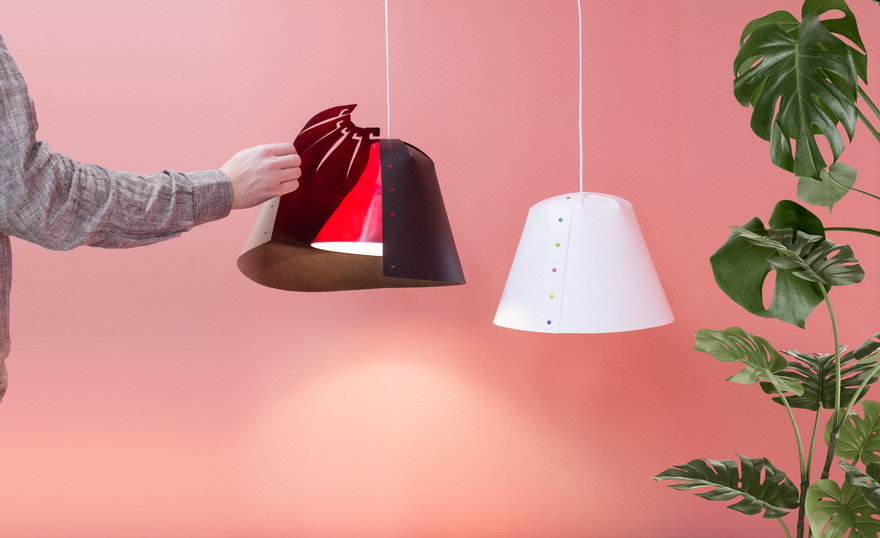How Art and Design Schools Put Kickstarter in the Classroom
Many of the world's leading creative programs are teaching students how to use Kickstarter. Here are perspectives—and live projects—from a few of them.
 The Matilda Rocking Note and Photo Stand is one of several from graduate students at RCA.
The Matilda Rocking Note and Photo Stand is one of several from graduate students at RCA.Today a class of Royal College of Art graduate students are preparing to show their latest work, but they're not hanging paintings or putting finishing touches on models. They're launching Kickstarter campaigns.
Under the guidance of repeat creator and RCA graduate Oscar Lhermitte, the workshop aims to teach students the full breadth of skills required to bring a design object to life.
Their projects range from rocking note holders to decorative lampshades to vintage patches for upcycling clothes, and they're the result of an emerging educational movement that values practical, experiential learning.
 The YksiKaksi lampshade wrap from RCA students Tomi Laukkanen and Mira Nameth.
The YksiKaksi lampshade wrap from RCA students Tomi Laukkanen and Mira Nameth.Crowdfunding is becoming common curriculum
Lhermitte's workshop at RCA is part of a growing number of art and design programs embracing Kickstarter as an educational tool. In 2014 the University of Illinois at Chicago started offering an Entrepreneurial Product Development class; Pratt has run a Design Entrepreneurship and Crowdfunding course since 2015; the Design Entrepreneurship course at Domus Academy in Milan has led students through annual rounds of three-month projects since 2016; The Cass at London Metropolitan University has Cass Starters, an extracurricular crowdfunding program; University of the Arts London and The Glasgow School of Art taught a Kickstarter module; and Parsons's Creatives and Entrepreneurship course in New York includes crowdfunding as a major part of the curriculum. And these are just a few of the schools making the subject a priority.
Professors see new opportunities and unmet needs
In many cases, these courses originate from professors trying to bring their curricula into the real world, and seeing Kickstarter as a straightforward way to do that.
Lhermitte first taught a connected products and Internet of Things (IoT) course with Durrell Bishop at RCA as part of the MA Design Products program, but the pair wanted students to get realistic about applications that would actually serve customers. "We were interested in creating products that real people want to use, and that's where we got the idea for a Kickstarter workshop," he says.
James Tooze, who coordinates the second year of the MA Design Products program, adds, "Quite often students in design education actively avoid the economic realities of their ideas—they don't want to 'taint' them with the constraints of reality. This can lead to proposals that, while interesting, often exhibit high levels of ambiguity in terms of how that type of work will help pay the bills as part of a professional practice. Doing a project on Kickstarter forces them to step out of theoretical design and instead design for a market and customer."
That audience focus also enforces the entrepreneurship skills that many programs are eager to expand. Peter Ragonetti, who teaches at Pratt, says, "When I studied industrial design at Pratt from 2000 to 2004, there were no classes on how to launch your own product or business. It felt like a major gap in the curriculum."
Students get hands-on entrepreneurial experience
Informed by his own hunger for entrepreneurial skills, Ragonetti has built his course, Design Entrepreneurship and Crowdfunding, to reflect the entrepreneurial journey. "I wanted to name it How to Get It Made, for Real," he says, "but academia likes more formal names."
Formalities aside, his class is very much about making things, for real. "The class uses crowdfunding as a method for students to understand the steps it takes to launch a successful entrepreneurial project, from idea validation to sourcing and prototyping to story and campaign building. I have had close to 100 students take the class, and many have told me later that it was one of the most important classes they took at Pratt."
Lhermitte's workshop also focuses on the full entrepreneurial journey. "I wanted to use Kickstarter as a tool for students to learn not just about prototypes and sketches, but what it takes to manufacture them, present them, tell their story," he says. "You want to make a product? Go talk to factories. Get quotes. Do the math to find out how much to charge for them. Talk to backers. By the time they've done all that, they have learned so much."
And Wendy W Fok, who teaches at Parsons, points out that many students have some baseline understanding of Kickstarter, which helps them pick up on entrepreneurial lessons more naturally. "Kickstarter is one of the several crowdfunding platforms my students may choose, however most prefer Kickstarter due to its cultural success amongst that age group. Most of the students who know of the platform have more affinity to it, and find it a positive method for marketing their concepts."
Thinking small might be the key to success
The programs almost universally focus on directing students towards small, achievable projects. Lhermitte structures his class around the Quickstarter concept he has championed on Kickstarter. His philosophy is that if you want to start making, try out a small project, in limited quantity, with an amateur video and no PR. Though his RCA students are some of the brightest minds in product development and design, none of them have experience researching factories, getting quotes, or planning production. He advises them to stick to one component, made with one process, from one material, in one factory—and to offer no more than 100 of them.
Ragonetti is of a similar mind. "Big ideas are amazing, but the crowdfunding class is about actually making and launching a project in 15 weeks," he says. "I try to get them to think about achievable projects that they can launch and manage on their own without massive capital. I want them to be excited to make something, but I also want to set them up for success."
Fok adds, "Throughout the semester, I encourage my students to make sure that they are succinct with their concepts and clear about their realities. These campaigns are permanent—they should use the platform wisely."
See all the RCA student projects—and many other projects—on the Quickstarter homepage.
-
o1Favorite This
-
Q2Comment
K
{Welcome
Create a Core77 Account
Already have an account? Sign In
By creating a Core77 account you confirm that you accept the Terms of Use
K
Reset Password
Please enter your email and we will send an email to reset your password.




Comments
How was this article written without mentioning the Entrepreneurial Design class at SVA's MFA Interaction Design program? Gary and Christina have been teaching students through crowdfunding since 2012: https://postindustrialdesign.school/background/
Thanks for adding it to the list! This is by no means extensive - seems almost every school we looked into has engaged with Kickstarter in some way.